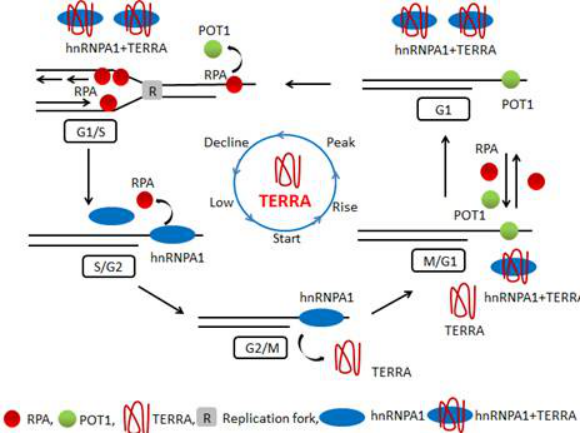Recently the thesis entitled Telomere Maintenance of TERRA Mediation for the course of Molecular Biology for the spring term of 2020 written by Ma Qing from the 2017 Base Class of Biotechnology of the School of Life Sciences of IMU was accepted by Progress in Biochemistry and Biophysics and published first in www.cnki.net after being revised under the guidance of Prof. Mergen, who teaches the course. Progress in Biochemistry and Biophysics is a Class 3 JRC journal for SCI collection in biology co-sponsored by Institute of Biophysics, Chinese Academy of Sciences and Biophysical Society of China. The thesis expounds on the influence of TERRA (telomeric repeat-containing RNA) on telomere maintenance and its functioning mechanism, introduces the structure and transcription features of TERRA, the formation and structural features of RNA heterozygote and R-loop, the DNA on which TERRA is dependent, the conjugated protein of TERRA and its functions, and discusses the mechanism of telomere maintenance molecule based on TERRA and its significance in life process.
Molecular Biology is among the first courses designated as national level first-class courses for undergraduates and the professional core courses of the State Biology Base Class of IMU, which is sponsored by the Project of First-class Course Construction of IMU. The teaching model of thecombination of lecturing in class, reading and writing after class and group discussion is adopted for the teaching of the course. The main features of the course are: (1) The model of instruction with the history of sciences is adopted. The students’ innovative thinking is cultivated, their interests in the course are aroused, their lofty ideals are helped formed, and the teaching of ideological and political theories is achieved through the telling of intriguing scientific stories, which include the proposition of assumptions, the logic in experiment design, the verification of experiments and the scientific experiences of Nobel Prize laureates in relevant fields. (2) The question-oriented teaching model is adopted. By assigning each student 1-2 scientific questions relevant to the contents of the course, the teacher directs the students to look up and read literature, write conclusive theses based on the questions to cultivate their ability to think independently and resolve questions on their own. (3) The model of group discussion is adopted to enliven the academic atmosphere in class and cultivate the students’ overall ability in scientific research. The teacher provides the students with theses published in Cell, Nature and Science in recent years and instructs the students to conduct extracurricular studies in groups and presentations and discussions between groups to ensure that the course keeps abreast the latest development and is forward-looking. (4) The English-Chinese bilingual teaching model is adopted and certain parts of the contents of the course are taught exclusively in English. The textbooks used are Molecular Biology (2nd Edition) by Robert F. Weaver and Molecular Biology of the Cell (5th Edition) by Bruce Alberts and Alexander Johnson.
The course is taught and organized by Prof. Mergen, Prof. Hada and Associate Professor Fan Lifei of the School of Life Sciences.


